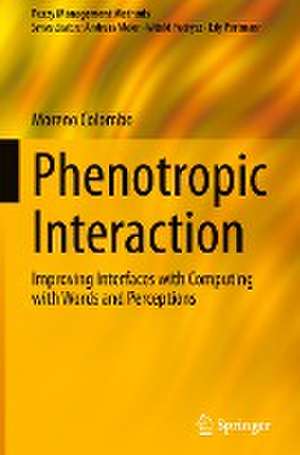Phenotropic Interaction: Improving Interfaces with Computing with Words and Perceptions: Fuzzy Management Methods
Autor Moreno Colomboen Limba Engleză Hardback – 4 noi 2023
This book presents the new paradigm of 'phenotropic' interaction, which aims to improve the naturalness of the interaction thanks to bio-inspired approaches. These include methods for understanding and reasoning with human perceptions expressed as natural language, fundamental to support the artificial system to better understand people's real desires and needs. Methods for improving the theories of computing with words and perceptions are developed in this book and applied to concrete use cases in prototypes enhancing the exchange of information with virtual assistants and smart city ecosystems. The presented use cases serve not only as examples of the application of the phenotropic interaction principles but also to verify their effective impact on communication.
Din seria Fuzzy Management Methods
- 18%
 Preț: 947.35 lei
Preț: 947.35 lei - 18%
 Preț: 724.00 lei
Preț: 724.00 lei - 20%
 Preț: 554.97 lei
Preț: 554.97 lei - 20%
 Preț: 558.62 lei
Preț: 558.62 lei -
 Preț: 371.58 lei
Preț: 371.58 lei - 20%
 Preț: 568.43 lei
Preț: 568.43 lei -
 Preț: 367.70 lei
Preț: 367.70 lei - 15%
 Preț: 643.00 lei
Preț: 643.00 lei - 18%
 Preț: 946.87 lei
Preț: 946.87 lei -
 Preț: 370.19 lei
Preț: 370.19 lei - 15%
 Preț: 635.31 lei
Preț: 635.31 lei - 18%
 Preț: 784.79 lei
Preț: 784.79 lei - 18%
 Preț: 781.62 lei
Preț: 781.62 lei - 15%
 Preț: 632.22 lei
Preț: 632.22 lei - 18%
 Preț: 939.77 lei
Preț: 939.77 lei
Preț: 727.97 lei
Preț vechi: 887.76 lei
-18% Nou
Puncte Express: 1092
Preț estimativ în valută:
139.31€ • 144.56$ • 116.44£
139.31€ • 144.56$ • 116.44£
Carte tipărită la comandă
Livrare economică 18 martie-01 aprilie
Preluare comenzi: 021 569.72.76
Specificații
ISBN-13: 9783031428180
ISBN-10: 3031428188
Ilustrații: XXV, 168 p. 31 illus., 27 illus. in color.
Dimensiuni: 155 x 235 mm
Greutate: 0.45 kg
Ediția:1st ed. 2024
Editura: Springer Nature Switzerland
Colecția Springer
Seria Fuzzy Management Methods
Locul publicării:Cham, Switzerland
ISBN-10: 3031428188
Ilustrații: XXV, 168 p. 31 illus., 27 illus. in color.
Dimensiuni: 155 x 235 mm
Greutate: 0.45 kg
Ediția:1st ed. 2024
Editura: Springer Nature Switzerland
Colecția Springer
Seria Fuzzy Management Methods
Locul publicării:Cham, Switzerland
Cuprins
Introduction.- Phenotropic Interaction.- Cognitive and Perceptual Computing.- Semantic Similarity Measures.- Automatic Precisiation of Meaning.- Fuzzy Analogical Reasoning.- Phenotropic Interaction in Virtual Assistants.- Phenotropic Interaction in Smart Cities.- Outlook and Conclusions.
Notă biografică
Moreno Colombo is currently a postdoctoral researcher at the Human-IST Institute of the University of Fribourg (Switzerland), where he aims with his research to improve people's everyday life, by increasing inclusion, sustainability, well-being, and comfort. During his Ph.D. in computer science, he focused on fuzzy systems and their application to the construction of bio-inspired and human-centric interaction methods between people and artificial systems, such as computers, buildings, and smart cities. His current research focuses on the interaction between people and buildings in order to investigate the possibility of promoting sustainability at the occupant, building, and neighborhood levels through societal and behavioral change, and is being carried out mainly in the context of the Smart Living Lab in Fribourg.
Textul de pe ultima copertă
Successful interaction between humans and artificial systems allows for combining the advantages of all actors in solving problems. However, interaction is often demanding for people, as it builds on artificial concepts, such as strict protocols.
This book presents the new paradigm of 'phenotropic' interaction, which aims to improve the naturalness of the interaction thanks to bio-inspired approaches. These include methods for understanding and reasoning with human perceptions expressed as natural language, fundamental to support the artificial system to better understand people's real desires and needs. Methods for improving the theories of computing with words and perceptions are developed in this book and applied to concrete use cases in prototypes enhancing the exchange of information with virtual assistants and smart city ecosystems. The presented use cases serve not only as examples of the application of the phenotropic interaction principles but also to verify their effectiveimpact on communication.
Caracteristici
Focuses on applications in the improvement of virtual assistants and smart city interfaces Introduces a novel human-centric, natural, and adaptive interaction paradigm Proposes advanced methods for the understanding and reasoning with people's perceptions
